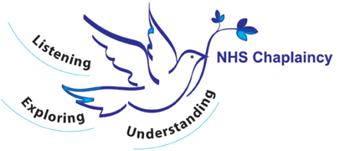Spiritual care
On this page
Spiritual care is given in a one-to-one relationship, and makes no assumptions about personal convictions or religious beliefs but seeks to understand the person as a whole.
The spiritual care team provides a 24/7 service in acute care settings and the Inverness area, including an out-of-hours (on call) service to enable round-the-clock service delivery.
Any member of the medical staff, a patient or a carer can make a referral to the team. We don't provide a multi-denomination chaplain, as all chaplains in Scotland (only) are generic, so responses to referrals would come initially from the spiritual care team. We can request faith representatives and belief groups to respond if requested.
Contact
To request support from the spiritual care team:
- phone 01463 704 463
- available Monday to Friday, 9am to 5pm
Alternatively, and outside normal office hours, call the main switchboard and ask for the Duty Chaplain.

About spiritual care
Spiritual care is at the heart of person-centred care. The Healthcare Quality Strategy for NHS Scotland defines person-centred care as:
"mutually beneficial partnerships between patients, their families and those delivering healthcare services, which respect individual needs and values"
It strives to address the fundamental human need to have a sense of peace, hope and meaning, particularly at times of challenge or trauma. People from every belief and faith community, or life stance, need support systems, especially in times of crisis.
They face ultimate questions about life and death. They search for meaning in the experience of illness, both acute and chronic. They look for help to cope with their illness and with suffering, loss, loneliness, anxiety, uncertainty, impairment, despair, anger and guilt. They consider ethical dilemmas which advancing technology and heightened expectations generate at the beginning and end of life. They address in depth, perhaps for the first time, the meaning of life.
Among the basic spiritual needs that might be addressed within the normal, daily activity of healthcare are:
- the need to give and receive love
- the need to be understood
- the need to be valued as a human being
- the need for forgiveness, hope and trust
- the need to explore beliefs and values
- the need to express feelings honestly
- the need to find meaning and purpose in life
For those who express their spirituality through a religious framework, processes are in place to have their religious needs met through the provision of appropriate people, and every effort made to provide facilities for their support while in an NHS Highland hospital.
This person-centred approach continues the trajectory of the delivery of spiritual care in Scotland for nearly 20 years. Person-centred spiritual care is consistent with, and supports, the approach, behaviours, and attitudes of Realistic Medicine.
Read: Discovering Meaning, Purpose And Hope Through Person Centred Well-being And Spiritual Care - A National Framework from Scottish Government.
Department of Spiritual Care
The department of Spiritual Care exists to care for the spiritual needs of patients, carers and staff.
Healthcare Chaplains are experienced in providing spiritual and pastoral care, in using presence, active listening, therapeutic narrative and other interventions. They deliver care in an open and accepting manner regardless of the presence or absence of faith, belief and life stance, assisting others in addressing painful or traumatic experiences.
The department aims to provide a service throughout the Highland HSCP area supporting the provision of spiritual care to patients, carers, volunteers and staff, ensuring that people remain at the centre of health and wellbeing by supporting:
- spiritual care
- religious care
- cultural care
- bereavement care
- listening services
- staff support service
The department shall:
- be characterised by openness, sensitivity, compassion and the capacity to make and maintain attentive, helpful, supportive and caring relationships with patients, carers and all staff groups
- be impartial, accessible and available 24 hours (within in-patient settings in the Inverness area) to all regardless of their personal belief or faith
- act as a significant resource for information and support to the organisation, supporting education and training when requested or when a need is identified
- provide an informed resource on ethical, spiritual and religious matters
- be impartial in order to provide a safe, neutral service for all
Sacred spaces
All NHS hospitals are required to provide at least one room set aside exclusively for worship, meditation or reflection. The room's title should make it clear it is a sanctuary, readily adaptable for the use of members of all belief communities or none.
Such spaces will be managed, on behalf of NHS Highland, by the Department of Spiritual Care and are provided for the benefit of the whole hospital community.
Facilities, where they are provided, are available to all people regardless of their beliefs. They will be accessible 24 hours a day and may be visited as places of quiet by patients, relatives and staff at any time.
Where such a room or space is requested but not provided, the department in partnership with local managers will identify an appropriate space for prayer and/or reflection.
Related services and accessibility
Your Services
-
All Services A-Z
A listing of health services at NHS Highland.
-
Find Your Nearest
Enter your postcode or location, then select the type of local service you're looking for and we'll provide a list of...
-
In-person services and locations
Lists and exact locations of hospitals, A&E departments, care homes, GP and dental practices, sexual health clinics, ...
-
Know Who To Turn To
Know how to get the right care, in the right place.
-
Near Me
NHS Highland offers Near Me video appointments.
